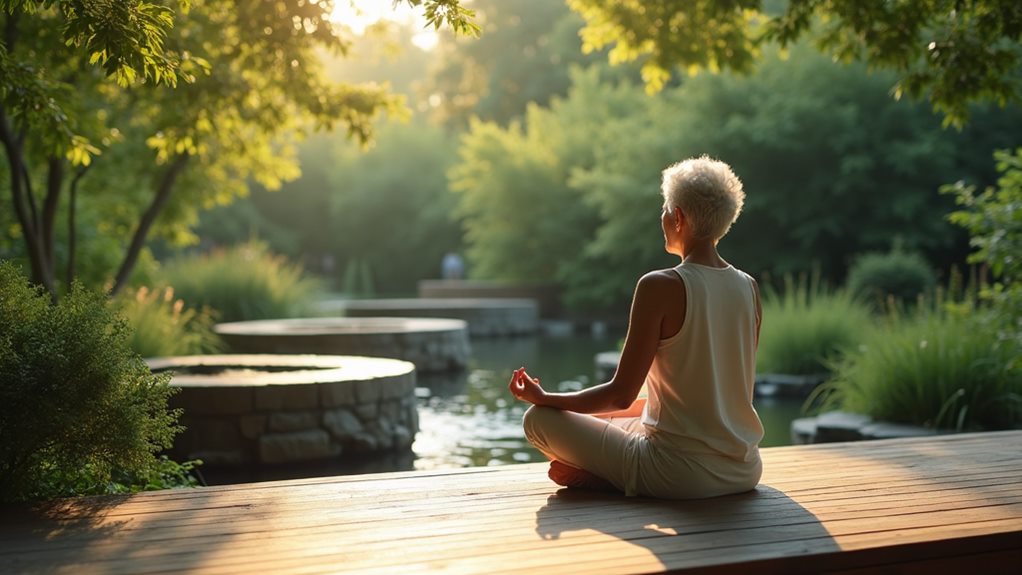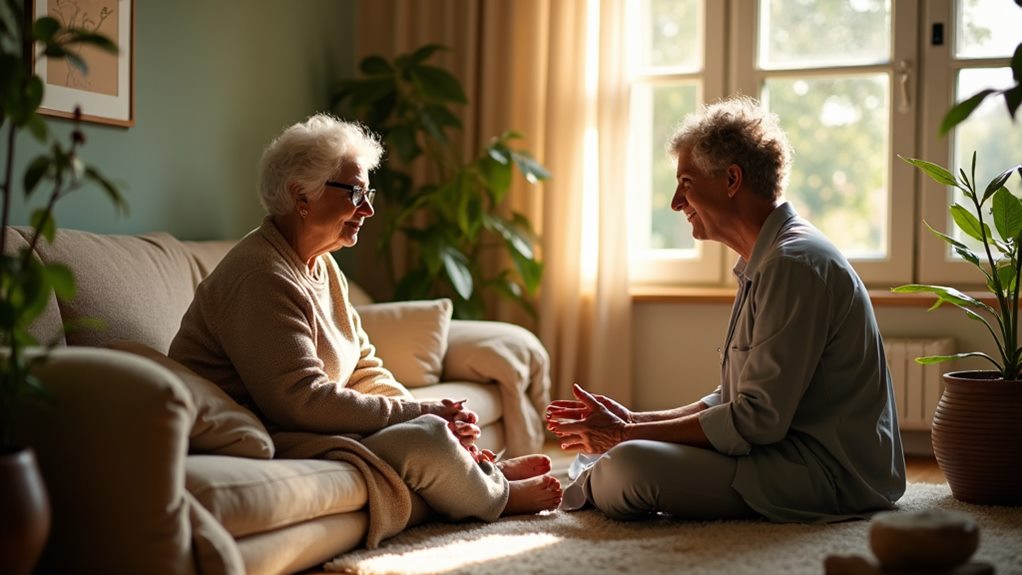
Feeling stressed out, dear senior citizen? Don’t fret! There are some golden tricks to ease those tensions. Start with breathing exercises like the 4-7-8 technique because who knew breathing came with a manual, right? Try meditation for mental clarity—it’s cheaper than brain-boosting vitamins! And while you’re at it, gentle yoga or Tai Chi can make you bendy—not pretzel-level but close. Let’s not forget eating right; yes, unfortunately, veggies have to be part of it. Pop on those walking shoes for some endorphin therapy. Need a buddy? Join a community class because it’s always better with company. Mysterious? You bet it is…
Understanding Senior Stress
Many seniors face unique stressors that can intensify both emotional and physical symptoms. Let’s face it, life hasn’t exactly been a gentle stroll since you turned 65. From chronic health issues cropping up like unwanted house guests to juggling caregiving duties, your stress levels can soar faster than a kite in a hurricane. It’s a tough gig, no doubt!
Engaging in progressive muscle relaxation or tai chi may help manage these stress levels by reducing physical tension and enhancing your overall well-being. This stress isn’t just a passing cloud; it’s a storm that could lead to serious health concerns like atherosclerosis or Type 2 diabetes, tanking your well-being. Who signed up for that, right?
Recognizing these symptoms early is like spotting a leaky roof before the downpour. Seniors, under stress, may experience physical issues like headaches or digestive snafus that turn your stomach into a circus act. You might feel emotionally frazzled, becoming irritable or withdrawing from your beloved social circles—just the opposite of that cheerful bingo night spirit!
And let’s not forget how this stress turns your concentration into a slippery eel. The good news? Catching stress early and effectively managing it can improve your health and enhance your life quality. After all, you’re here for the golden years, not grey-stress years. So, why wait?
Causes of Stress in Aging
Steering the journey of aging often brings a plethora of challenges that act as stress catalysts for seniors. Health problems sprout up like dandelions, insisting they’re permanent household members when no one invited them. This is especially challenging considering the increased risk of chronic diseases due to physiological and nutritional changes with aging.
Chronic stress? Oh, that’s the unwelcome guest that never leaves, especially when you’re juggling caregiving responsibilities for loved ones. It’s like running a marathon with no finish line, ending in physical and emotional burnout.
Financial concerns can feel like a relentless rain cloud, overshadowing the golden years with worry and uncertainty. Retirement might promise freedom, but unfortunately, it sometimes swaps busy workdays for purposelessness. Like ordering a pizza and getting a box full of air. Yay, surprises!
Loneliness, too, finds its way into this mix, seeping in during moments of solitude or when grieving the loss of loved ones. You might feel like you’re on a deserted island with only Netflix as your companion.
Major life changes—oh joy!—like moving to a new home or adjusting to living alone, can intensify this situation.
Understanding these stress causes helps you support the seniors in your life better. Let’s tackle this together, shall we? We’ve got this!
Symptoms to Watch For

Recognizing the symptoms of stress in seniors is essential for effective management and support. You notice those pesky tension headaches—they’re not just part of getting older. They, along with digestive problems and heart palpitations, can severely impact daily life.
Keep an eye on emotional signs too. If you see irritability, social withdrawal, or those unexpected tearful moments, it’s not your imagination. That’s stress knocking on the door.
Stress can also disrupt the sleep-wake cycles and prevent one from feeling refreshed upon waking. Ensuring regular exposure to morning light can help regulate these cycles and reduce stress-induced sleep disturbances.
Sleep disturbances? Oh yes, insomnia and tossing and turning like you’re on a bed of nails could signal stress. Cognitive effects shouldn’t be ignored either. If you or your loved one are experiencing poor concentration or indecisiveness, don’t shrug it off. These can lead to difficulties in decision-making and even more anxiety, possibly affecting overall physical and mental health.
Now, here’s why acting early matters: chronic stress can seriously worsen health issues like heart disease and diabetes. It’s like adding fuel to a fire.
Breathing Techniques
When it comes to soothing stress, breathing techniques offer a simple yet powerful tool for seniors. Imagine a moment of pure relaxation in the chaos—sounds great, doesn’t it? Breathing exercises, like the 4-7-8 technique, can be your gateway. Inhale for 4 seconds, hold for 7, and exhale for 8. Easy, right? This small act promotes relaxation, melts tension, and may even put anxiety on pause. Who would’ve thought counting could be so calming?
Let’s not forget belly breathing. It’s not just for yogis or opera singers. When you engage the diaphragm, your belly expands—kinda like blowing up a balloon. This technique not only increases oxygen exchange but also boosts your immune system. You’re basically a superhero in reclining mode.
Plus, these strategies are free and adaptable. They can be practiced anywhere—while waiting for coffee or watching paint dry.
Regular focused breathing exercises benefit your sleep quality and overall well-being by calming your nervous system. So, ready to breathe your way to bliss? Make it a daily routine, sprinkle in some humor, and watch the stress slink away. After all, you deserve a bit of tranquility!
Benefits of Meditation

Feeling scattered or anxious?
Meditation can swoop in as your stress-busting superhero, boosting mental clarity and kicking anxiety to the curb, even if it’s just stealing 15 minutes from your daily soap opera time.
Seriously, it’s like your brain’s version of a spa day—without the cucumber slices, but with all the relaxation perks.
Mental Clarity Enhancement
Meditation offers numerous benefits, especially for seniors, by greatly enhancing mental clarity. Preferably not from yelling at the TV! With mindfulness practices, you can improve overall health and well-being. Meditation boosts focus and concentration, turning the brain into a well-oiled machine. Imagine having a 23% longer attention span—yes, that’s no joke! You’ll cut distractions and experience improved cognitive performance in daily life.
Here’s a quick guide to motivate your meditation journey:
| Benefit | Improvement | Time Commitment |
|---|---|---|
| Focus & Concentration | 23% attention boost | 15 mins/day |
| Working Memory | Enhanced flexibility | 15 mins/day |
| Social Interactions | 50% less mind-wandering | Regular practice |
| Decision-Making | Better cognitive ability | 15 mins/day |
| Mental Clarity | 30% improvement | Consistent practice |
In as little as 15 minutes daily, meditation can improve working memory, helping you like a GPS for those complex decisions. Mind-wandering? It drops by half! Engaging fully in conversations becomes a breeze. Plus, for seniors practicing meditation, it translates to a 30% boost in mental clarity and lower anxiety (we’ll save the anxiety pep talk for later). Immerse yourself in meditation now—your vibrant, brainy future awaits!
Anxiety Reduction Benefits
Anxiety doesn’t stand a chance against the calming power of meditation. Seriously, those swirling thoughts melt like ice cream on a hot day. Regular practice has you mastering anxiety reduction, and all it takes is 15 minutes of your precious time.
Deep breathing, anyone? It’s like a secret weapon against stress. Just imagine sitting comfortably, eyes gently closed, focusing on your breath. Inhale… exhale… see that? The worries from yesterday or worries about tomorrow begin to vanish.
Mindfulness is your trusty sidekick. It keeps you present, concentrating on what’s happening now rather than spiraling into “what ifs.” This kind of focus sharpens your mind, which is super handy, especially if you desire helping others but feel bogged down by foggy thoughts.
And when it comes to emotional regulation, meditation gives you the upper hand. You’ll find yourself more resilient to stress, laughing off what would’ve driven you up the wall before.
Plus, it supports your overall mental health, potentially keeping hypertension and depression at bay. So, why not give it a try? After all, your anxiety can’t hog all the attention; let meditation steal the spotlight instead!
Yoga and Tai Chi
Ready to find your zen while staying on your feet? Yoga and Tai Chi are your new best friends!
These gentle movements aren’t just about staying limber and avoiding those oh-so-fun surprise falls but also kicking stress to the curb with a boost of feel-good endorphins—it’s like your brain throwing a little party without the noise complaints.
Balancing Through Motion
Finding balance through motion can be a transformative experience, especially for seniors aiming to relieve stress gently.
You’re probably thinking, “Exercise? Really? At my age?” But hold on, because physical activity like tai chi can do wonders for both your body and spirit.
It’s not about running marathons—it’s about those calming, flowing movements that boost blood flow and improve your quality of life. Imagine feeling more balanced, literally and figuratively, as you gracefully move around like some kind of Zen ninja. Who needs chaos when you can have calm?
Now, let’s talk yoga. Specifically, Hatha yoga—with its gentle stretches and poses—is like giving your body a delightful hug.
And not only are you stretching those muscles, but your state of mind gets a boost too. Plus, let’s not forget the added perk: taking a class.
Join a group, make new friends, laugh at how inflexible you were on day one, and experience the joy of not only a healthier body but a more connected spirit.
You can’t put a price on that! So, get up, get moving, and embrace these rejuvenating practices.
Your future self will thank you, promise.
Endorphin Boost Benefits
Imagine a gentle wave of tranquility washing over you as you engage in yoga or tai chi, releasing endorphins that lighten your mood and melt away stress. As an older adult, you’re juggling far more than a circus clown—doctor appointments, medications, and let’s not forget, grandchildren!
Yoga and tai chi aren’t just exercises; they’re sanity savers you never knew you needed. These practices improve not only your mental outlook but your physical health too. Think of endorphins—the body’s very own happy pills. They reduce stress like magic. Abracadabra!
Yoga and tai chi are like your magic carpet ride to peace in just 20-30 minutes. They zing up your mood and lower those pesky cortisol levels that have you feeling like a grumpy cat.
For older adults, tai chi can even help you regain balance and confidence, cutting down the fear of falls. You could say it’s “meditation in motion” with perks.
Mindful Movement Practices
Ease into the world of mindful movement practices like yoga and tai chi, where gentle poses and flowing motions help you unwind and let go of stress. Imagine releasing muscle tension with each slow stretch in yoga or graceful step in tai chi. Who knew relaxation could be this elegant, right?
These practices aren’t just for the young and bendy or those who wear spandex—trust me, you don’t need a leotard to get in on this stress-busting action.
Yoga is all about balance. It’s adaptable, so you don’t need to twist yourself into a human pretzel to participate. Healthcare professionals often recommend hatha yoga because it’s great for seniors, thanks to its easily modified postures.
Tai Chi, on the other hand, is like a slow dance with the air. Its gentle flow boosts mindfulness and calm, sneaking in a workout without you even realizing.
Both involve endorphin-releasing movements that can elevate your mood and keep anxiety at bay. You’ll improve mental clarity and emotional stability in no time.
Importance of Nutrition

Nutrition plays an essential role in managing stress levels for seniors, providing the building blocks for a stable mood and sustained energy. You might think of nutrition as just another stress relief tip, but it’s so much more. A balanced diet can truly be your best friend, especially when it comes to mood regulation and keeping that pesky heart disease at bay.
Imagine feeling more energized and less cranky—it’s not a distant dream! Just a tweak in your eating habits can do wonders.
Let’s talk specifics: Eating foods rich in fiber, vitamins, and minerals keeps your energy stable and your spirits high. And let’s not forget the importance of nutrients like calcium, magnesium, and vitamin D. These guys are the unsung heroes who keep your bones strong and stress-related illnesses at a distance.
Who knew a bowl of leafy greens could pack such a punch?
Ever tried fish or walnuts? They’re loaded with omega-3 fatty acids, which boost brainpower and emotional well-being. Drinking enough water is key, too. Trust me, dehydration isn’t your friend—it leads to fatigue and bad moods.
Role of Physical Activity
Engaging in regular physical activity offers seniors a powerful way to enhance their overall well-being and manage stress. Hey, who knew breaking a sweat could change your life, right?
Physical activity helps boost endorphins, those little mood-lifting hormones, making you feel like the hero in your own action movie—minus the explosions. By improving your balance, flexibility, and strength, you’re not only keeping stress at bay but also standing firm against fall hazards. Let’s face it, graceful is your new middle name.
Older adults engaging in group workouts also enjoy social perks. Think of it as a friendly club, just without the secret passwords. These connections fend off loneliness while you’re busy lowering blood pressure and enjoying those benefits of relaxation.
The physical benefits don’t stop there. You’ll give your brain quite the pep-up, potentially slowing down cognitive decline and reducing dementia risks. Isn’t feeling sharper while reducing stress a win-win?
According to the CDC, shooting for 150 minutes of moderate-intensity activities like tai chi or brisk walking each week can serve you well. So why not make exercise a part of your weekly routine? Your body, mind, and maybe even your social calendar will thank you!
Seeking Professional Help

Many seniors find that seeking professional help for stress management is essential to maintaining their quality of life.
Let’s face it, stress can sneak up on you like an uninvited guest at a party. You may not even notice it’s there until it overstays its welcome and leaves you feeling drained. That’s where professional help comes in handy. It’s like having a trusted ally who knows all the right coping strategies to tackle that stress head-on.
With the rise of telehealth services, you don’t even have to leave your cozy armchair. Just imagine dealing with chronic illness from home while binge-watching your favorite shows. Sounds less stressful already, right?
Regular mental health screenings are like getting a tune-up for your mind. They’re empowering, helping you spot stress symptoms before they spiral out of control. Early intervention can greatly cut down the risk of chronic conditions linked to stress.
And remember, therapy isn’t just lying on a couch spilling your guts. It’s about boosting emotional resilience and promoting overall well-being.
Plus, ever heard of group therapy? Yes, you’ll be among peers, so no need to wear fancy pants. Just bring yourself and a sense of humor!
Community and Support Systems
Community and support systems form the backbone of stress relief for seniors by providing essential social interactions and a sense of belonging.
Imagine feeling like the most popular kid in the cafeteria—only now it’s at your local senior center. These community support systems offer activities and groups to help shoo away loneliness and bring people together for good times.
You’ve got the National Council on Aging (NCOA) to thank for resources that ease stress while giving you access to crucial social connections. It’s like having a helping hand stretch out across the nation, just for your well-being.
Here’s how you can maximize these benefits:
- Join a local senior center’s activities: Meet new friends and fill your calendar with fun.
- Access financial aid programs: SNAP isn’t just a catchy acronym; it can lessen financial burdens, so you can focus on your health.
- Attend community workshops: Learn stress strategies and maybe even teach others a trick or two.
- Volunteer: Experience the joy of helping others, which magically boosts your emotional well-being.
Don’t underestimate the power of a community. After all, even the biggest challenges seem smaller when you’ve got a group cheering you on.
In Summary
Hey, remember the saying, “An ounce of prevention is worth a pound of cure”? It’s spot on for tackling stress in your golden years. So, breathe deeply, my friend! Immerse yourself in meditation and munch on nutritious snacks. Get moving, even if it means dancing in your living room. Don’t be shy to ask for help; pros and pals can be lifesavers. Don’t stress alone—it’s overrated! Keep it light, keep it active, and keep it joyful.














